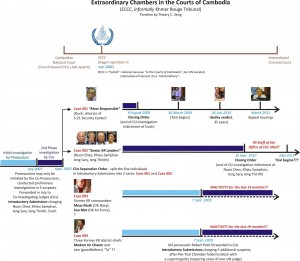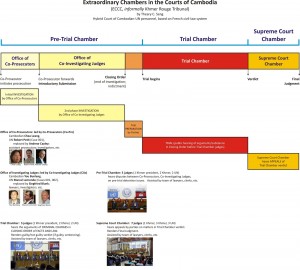In preparation for the start of trial hearings beginning on 27 June 2011 of Case 002 against the surviving Khmer Rouge senior leaders Nuon Chea, Khieu Samphan, Ieng Sary and Ieng Thirith, KI Media is starting a new series in posting installations of the public document of the Closing Order of Case 002. The Closing Order of the Co-Investigating Judges forms the basic document from which all the parties (Co-Prosecutors, Co-Lead Lawyers for all civil parties, Defense Lawyers) will be making their arguments before the Trial Chamber judges (one Cambodian President, 2 Cambodian Judges, 2 UN judges). Up until now, the hearings involving these four surviving senior Khmer Rouge leaders have been in the Pre-Trial Chamber over issues of pre-trial detention and jurisdictional issues. Beginning in June 2011, the Trial Chamber will hear the substantive arguments over the criminal charges (e.g. genocide, crimes against humanity, penal code of 1956).
. . .
CLOSING ORDER
of Co-Investigating Judges You Bunleng and Marcel Lemonde, 15 September 2010
II. ADMINISTRATIVE STRUCTURES (CENTRE)
A. THE COMMUNIST PARTY OF KAMPUCHEA (CPK)
- 33. As of 17 April 1975, the CPK was governed by a Statute which had been initially adopted at the Party’s first Congress, in September 1960.74 In January 1976, a new Statute75 was adopted at the Party’s Fourth Congress76 that outlined the ideology, membership, structure and organization of the Party. Within the Statute a number of state bodies were particularized: the Revolutionary Army of Kampuchea,77 the national system of Party Committees,78 the Party Central Committee,79 and “various offices and ministries surrounding the Central Committee”.80 The Party itself was governed by a Central Committee and a Standing Committee.81


